Shayan Jawed
Hyperparameter Tuning MLPs for Probabilistic Time Series Forecasting
Mar 07, 2024Abstract:Time series forecasting attempts to predict future events by analyzing past trends and patterns. Although well researched, certain critical aspects pertaining to the use of deep learning in time series forecasting remain ambiguous. Our research primarily focuses on examining the impact of specific hyperparameters related to time series, such as context length and validation strategy, on the performance of the state-of-the-art MLP model in time series forecasting. We have conducted a comprehensive series of experiments involving 4800 configurations per dataset across 20 time series forecasting datasets, and our findings demonstrate the importance of tuning these parameters. Furthermore, in this work, we introduce the largest metadataset for timeseries forecasting to date, named TSBench, comprising 97200 evaluations, which is a twentyfold increase compared to previous works in the field. Finally, we demonstrate the utility of the created metadataset on multi-fidelity hyperparameter optimization tasks.
Forecasting Early with Meta Learning
Jul 19, 2023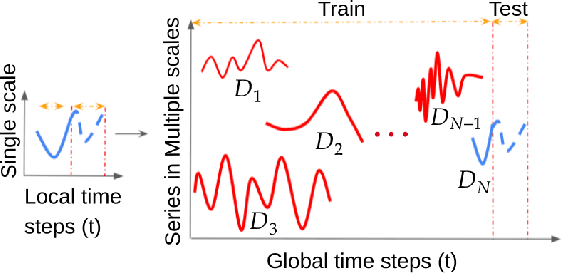
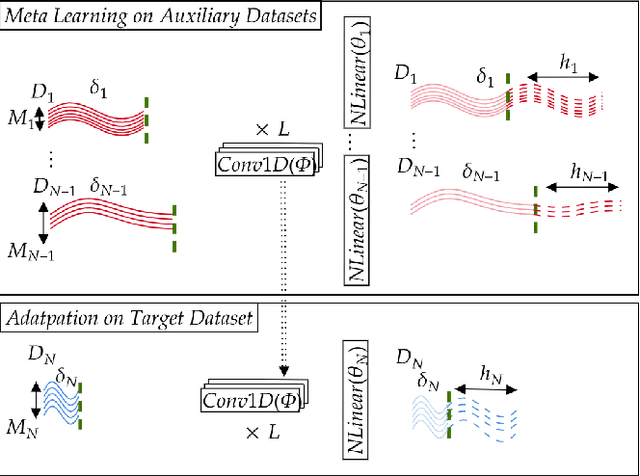

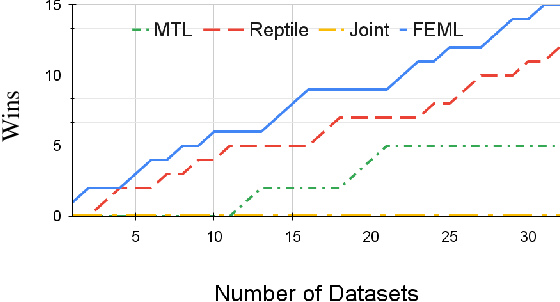
Abstract:In the early observation period of a time series, there might be only a few historic observations available to learn a model. However, in cases where an existing prior set of datasets is available, Meta learning methods can be applicable. In this paper, we devise a Meta learning method that exploits samples from additional datasets and learns to augment time series through adversarial learning as an auxiliary task for the target dataset. Our model (FEML), is equipped with a shared Convolutional backbone that learns features for varying length inputs from different datasets and has dataset specific heads to forecast for different output lengths. We show that FEML can meta learn across datasets and by additionally learning on adversarial generated samples as auxiliary samples for the target dataset, it can improve the forecasting performance compared to single task learning, and various solutions adapted from Joint learning, Multi-task learning and classic forecasting baselines.
Auxiliary Quantile Forecasting with Linear Networks
Dec 05, 2022

Abstract:We propose a novel multi-task method for quantile forecasting with shared Linear layers. Our method is based on the Implicit quantile learning approach, where samples from the Uniform distribution $\mathcal{U}(0, 1)$ are reparameterized to quantile values of the target distribution. We combine the implicit quantile and input time series representations to directly forecast multiple quantile estimations for multiple horizons jointly. Prior works have adopted a Linear layer for the direct estimation of all forecasting horizons in a multi-task learning setup. We show that following similar intuition from multi-task learning to exploit correlations among forecast horizons, we can model multiple quantile estimates as auxiliary tasks for each of the forecast horizon to improve forecast accuracy across the quantile estimates compared to modeling only a single quantile estimate. We show learning auxiliary quantile tasks leads to state-of-the-art performance on deterministic forecasting benchmarks concerning the main-task of forecasting the 50$^{th}$ percentile estimate.
A.I. and Data-Driven Mobility at Volkswagen Financial Services AG
Feb 09, 2022Abstract:Machine learning is being widely adapted in industrial applications owing to the capabilities of commercially available hardware and rapidly advancing research. Volkswagen Financial Services (VWFS), as a market leader in vehicle leasing services, aims to leverage existing proprietary data and the latest research to enhance existing and derive new business processes. The collaboration between Information Systems and Machine Learning Lab (ISMLL) and VWFS serves to realize this goal. In this paper, we propose methods in the fields of recommender systems, object detection, and forecasting that enable data-driven decisions for the vehicle life-cycle at VWFS.
Data-Driven Vehicle Trajectory Forecasting
Feb 09, 2019

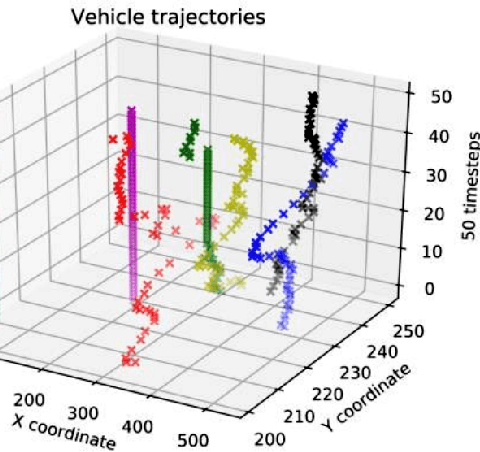
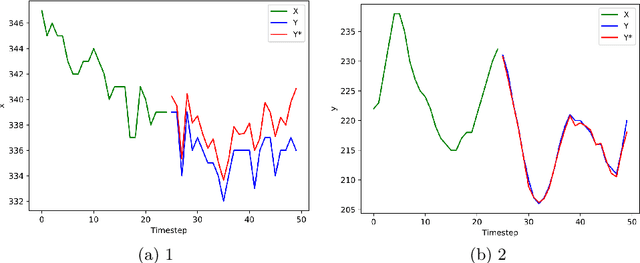
Abstract:An active area of research is to increase the safety of self-driving vehicles. Although safety cannot be guarenteed completely, the capability of a vehicle to predict the future trajectories of its surrounding vehicles could help ensure this notion of safety to a greater deal. We cast the trajectory forecast problem in a multi-time step forecasting problem and develop a Convolutional Neural Network based approach to learn from trajectory sequences generated from completely raw dataset in real-time. Results show improvement over baselines.
 Add to Chrome
Add to Chrome Add to Firefox
Add to Firefox Add to Edge
Add to Edge